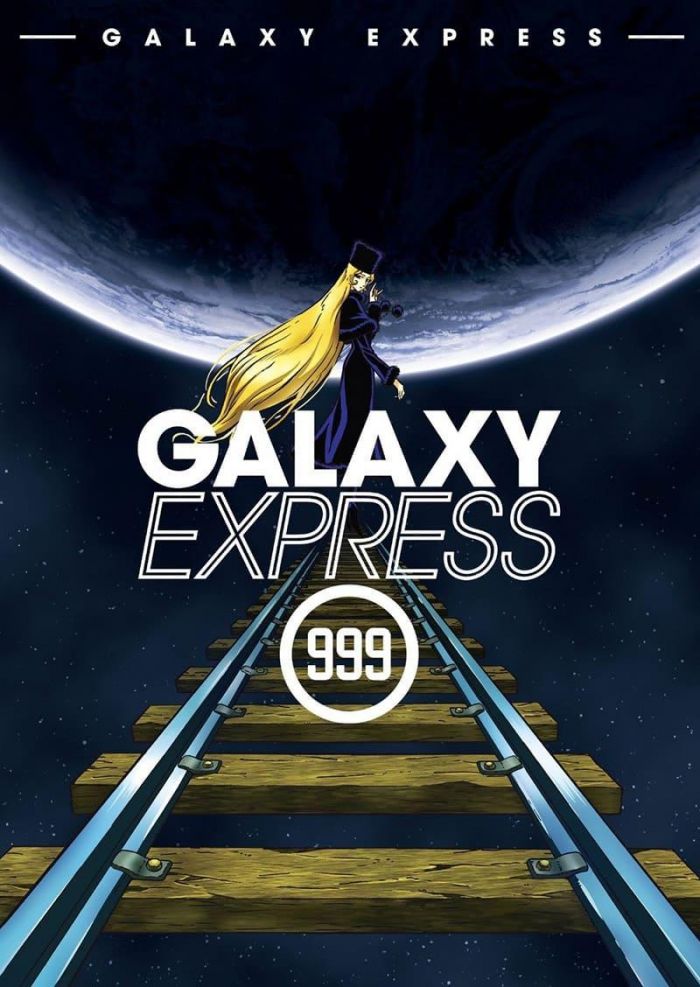
There are always dangers when you watch a supposed classic, that it might just not live up to its “classic” status. That, while it may be a “classic” and may have been great at one time, it’s been surpassed by those that have followed in its footsteps. It may have been inspiring at one time, but looking back, it scarcely seems to live up to expectations. Such were my reactions to Galaxy Express 999. There are several sites devoted to espousing the charm and magic of this film. Unfortunately, it’s a charm and magic that never materialized for me.
Galaxy Express 999 was based on a long-running manga series by Leiji Matsumoto (who also created Star Blazers, as it was known here in the US). It tells the story of Tetsuro Hoshino, a young street urchin obsessed with with getting on the Galaxy Express 999, a Jules Verne-esque spaceship made to look like an old 19th century steam train. He hopes to travel to the Andromeda galaxy and receive a free mechanical body, so that he may avenge his mother’s death at the hands of Count Mecha, a leader of the mechanized people. After a failed attempt at getting a ticket, he encounters the enigmatic Maetel, a woman who looks just like Tetsuro’s mother. She offers him a ticket to board the Galaxy Express 999, in exchange that she can come along.
Through his journeys across the solar system, Tetsuro discovers the loneliness and despair that mechanical bodies create. Tetsuro soon realizes that all mechanical people must be destroyed, or else humanity is threatened. Along the way, he begins to suspect that Maetel may not be as benevolent as previously thought, especially when they arrive at the Mechanized Empire’s homeworld.
There’s certainly an epic feel to Galaxy Express 999. The movie deals with lofty concepts such as love, honor, and the basic ideas of what it means to be human. When Tetsuro leaves Earth, he’s nothing more than a brash urchin. However, along the way, he must quickly grow up if he is to carry on his mission of vengeance and honor. However, the devil is in the details, and it’s here that Galaxy Express 999 ultimately fails.
Originally released in 1979, the animation is quite poor when compared to anime nowadays, and in certain places, the character designs are simply horrible. Sad as it may seem, this really does detract from the storyline, since I found myself jarred by the oftentimes crude animation.
Although the movie’s story starts off easily enough, it grows more and more convoluted as the movie passes. Plotline upon plotline is heaped onto the basic story, until it all becomes a confusing mess. Famous characters from some of Matsumoto’s other titles (Captain Harlock and Emeraldas) appear, though their appearances are seemingly at random and merely to fill in a plot hole. By the time the story tries to wrap up all of the elements into one nice, neat package, it feels rushed and done for the sake of convenience.
As I understand it, there were several Galaxy Express 999 movies, each following Tetsuro’s attempts to overthrow the Mechanical Empire and save humanity from serving machines. I’d seen bits and pieces of them, but this was the first one I had seen all of the way through. However, it leaves me with a bad taste in the mouth. There were so many elements of the story that could have made for an enjoyable picture, not the least of which was following Tetsuro’s progression to manhood and his appreciation of his own humanity. But the movie doesn’t do any of the concepts justice and I just end up feeling cheated by the film’s outcome, not to mention disappointed by the film’s quality.
I’ve heard many people describe this as a serious, “adult” anime, but I don’t buy it. I would love to see a remake of this, one that deals with the subject matter seriously instead of trying to make the plot more complex than it has strength to be, one that does justice to the epic feel of the movie without reducing it to a complicated mess.
